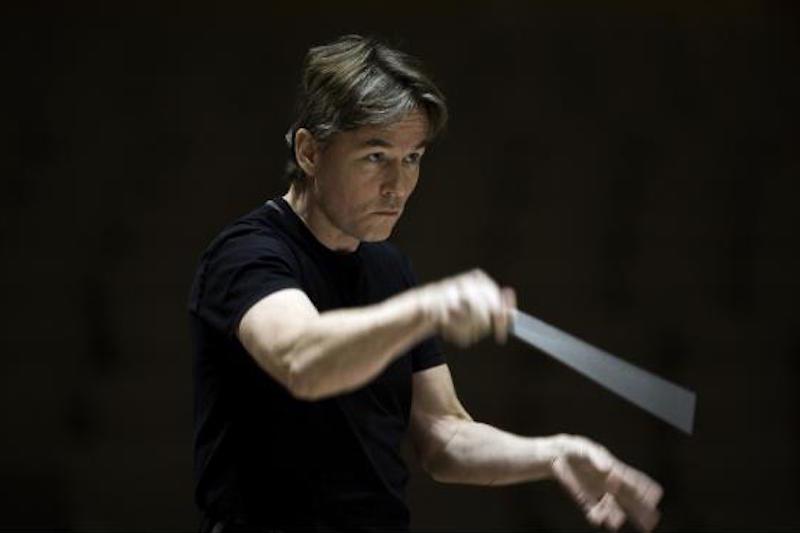Stravinsky: Myths & Rituals, Philharmonia, Salonen, RFH | reviews, news & interviews
Stravinsky: Myths & Rituals, Philharmonia, Salonen, RFH
Stravinsky: Myths & Rituals, Philharmonia, Salonen, RFH
Finding the fun in early and late ballets

Looking past the ballets for Diaghilev, there are still many superb scores by Stravinsky honoured more in scholarship than performance. In Myths and Rituals, the Philharmonia addresses that lack of wider appreciation with five concerts from May to September. The series got off to a promising start last night with the tiny fanfare for three trumpets – Monteverdi with attitude and wrong notes – from 1955, which was one of Stravinsky’s first thoughts for his last ballet, Agon.
The Symphonies of Wind Instruments are often played and heard as a Cubist funeral rite, moving in discontinuous blocks of sound. Salonen briskly directed a remarkable performance against the grain of the work’s usual reception, but entirely in keeping with its context as a prelude to the pagan songlines threaded through the Rite of Spring. Chords and melodies answered rather than ignored each other. The brass climax was almost celebratory, and the slowly shifting textures of the coda thinned out like dancers leaving the stage one by one.
 A pocket miracle of invention, Agon will always be a challenge for performers and audiences – 12-tone Stravinsky isn’t for everybody – and the solo parts lacked the last degree of confidence that comes with a run of performances. Nonetheless, the Phiharmonia turned on a sixpence at Salonen’s challenging tempi. Behind and above them at the back of the Festival Hall stage, a reduced staging paid passing homage to Balanchine’s original concept. In a slightly apologetic programme note and promotional video, the choreographer Karole Armitage (pictured above right) admitted that Agon is perfect as it was conceived, and with limited space and rehearsal time, six dancers from her company did well to hint at the wit and delicacy of a fully-staged production.
A pocket miracle of invention, Agon will always be a challenge for performers and audiences – 12-tone Stravinsky isn’t for everybody – and the solo parts lacked the last degree of confidence that comes with a run of performances. Nonetheless, the Phiharmonia turned on a sixpence at Salonen’s challenging tempi. Behind and above them at the back of the Festival Hall stage, a reduced staging paid passing homage to Balanchine’s original concept. In a slightly apologetic programme note and promotional video, the choreographer Karole Armitage (pictured above right) admitted that Agon is perfect as it was conceived, and with limited space and rehearsal time, six dancers from her company did well to hint at the wit and delicacy of a fully-staged production.
After the hair-trigger coordination of Agon, the Philharmonia took an exhilarating romp through the Rite of Spring. Sometimes, this was a little too much like the concerto for orchestra – more particularly for brass and percussion – that is commonly made out of what used to be weird and challenging (again, for both performers and audiences). Some smudgy chords and more harum-scarum speeds were worthy of the ballet’s infamously chaotic premiere in 1913. Had the dancers stayed on, they might have objected to Salonen’s habit of getting faster in a piece which derives a lot of its primal energy in performance from the setting of a chosen tempo in a given dance and sticking to it. He and the orchestra have given many Rites together over the years, and the groove of familiarity has its pros and cons.
However, there was much to admire: in the punky strut of the strings through the Spring Rounds; in Salonen’s handling of the Procession of the Sage, which built with controlled barbarism towards an ear-splitting climax; in the intertwining wind lines which flowed heedlessly through the Second Part’s introduction like an ancient river. Everyone on stage, and especially Salonen, looked to be having tremendous fun.
- The concert is broadcast by BBC Radio 3 on 16 May at 7.30pm. The next concert in Myths and Rituals takes place at the Royal Festival Hall on 26 May
rating
Share this article
The future of Arts Journalism
You can stop theartsdesk.com closing!
We urgently need financing to survive. Our fundraising drive has thus far raised £49,000 but we need to reach £100,000 or we will be forced to close. Please contribute here: https://gofund.me/c3f6033d
And if you can forward this information to anyone who might assist, we’d be grateful.

Subscribe to theartsdesk.com
Thank you for continuing to read our work on theartsdesk.com. For unlimited access to every article in its entirety, including our archive of more than 15,000 pieces, we're asking for £5 per month or £40 per year. We feel it's a very good deal, and hope you do too.
To take a subscription now simply click here.
And if you're looking for that extra gift for a friend or family member, why not treat them to a theartsdesk.com gift subscription?
more Classical music
 Robin Holloway: Music's Odyssey review - lessons in composition
Broad and idiosyncratic survey of classical music is insightful but slightly indigestible
Robin Holloway: Music's Odyssey review - lessons in composition
Broad and idiosyncratic survey of classical music is insightful but slightly indigestible
 Classical CDs: Wolf-pelts, clowns and social realism
British ballet scores, 19th century cello works and contemporary piano etudes
Classical CDs: Wolf-pelts, clowns and social realism
British ballet scores, 19th century cello works and contemporary piano etudes
 Bizet in 150th anniversary year: rich and rare French offerings from Palazzetto Bru Zane
Specialists in French romantic music unveil a treasure trove both live and on disc
Bizet in 150th anniversary year: rich and rare French offerings from Palazzetto Bru Zane
Specialists in French romantic music unveil a treasure trove both live and on disc
 Scottish Chamber Orchestra, Ibragimova, Queen’s Hall, Edinburgh review - rarities, novelties and drumrolls
A pity the SCO didn't pick a better showcase for a shining guest artist
Scottish Chamber Orchestra, Ibragimova, Queen’s Hall, Edinburgh review - rarities, novelties and drumrolls
A pity the SCO didn't pick a better showcase for a shining guest artist
 Kilsby, Parkes, Sinfonia of London, Wilson, Barbican review - string things zing and sing in expert hands
British masterpieces for strings plus other-worldly tenor and horn - and a muscular rarity
Kilsby, Parkes, Sinfonia of London, Wilson, Barbican review - string things zing and sing in expert hands
British masterpieces for strings plus other-worldly tenor and horn - and a muscular rarity
 From Historical to Hip-Hop, Classically Black Music Festival, Kings Place review - a cluster of impressive stars for the future
From quasi-Mozartian elegance to the gritty humour of a kitchen inspection
From Historical to Hip-Hop, Classically Black Music Festival, Kings Place review - a cluster of impressive stars for the future
From quasi-Mozartian elegance to the gritty humour of a kitchen inspection
 Shibe, LSO, Adès, Barbican review - gaudy and glorious new music alongside serene Sibelius
Adès’s passion makes persuasive case for the music he loves, both new and old
Shibe, LSO, Adès, Barbican review - gaudy and glorious new music alongside serene Sibelius
Adès’s passion makes persuasive case for the music he loves, both new and old
 Anja Mittermüller, Richard Fu, Wigmore Hall review - a glorious hall debut
The Austrian mezzo shines - at the age of 22
Anja Mittermüller, Richard Fu, Wigmore Hall review - a glorious hall debut
The Austrian mezzo shines - at the age of 22
 First Person: clarinettist Oliver Pashley on the new horizons of The Hermes Experiment's latest album
Compositions by members of this unusual quartet feature for the first time
First Person: clarinettist Oliver Pashley on the new horizons of The Hermes Experiment's latest album
Compositions by members of this unusual quartet feature for the first time
 Gesualdo Passione, Les Arts Florissants, Amala Dior Company, Barbican review - inspired collaboration excavates the music's humanity
At times it was like watching an anarchic religious procession
Gesualdo Passione, Les Arts Florissants, Amala Dior Company, Barbican review - inspired collaboration excavates the music's humanity
At times it was like watching an anarchic religious procession
 Classical CDs: Camels, concrete and cabaret
An influential American composer's 90th birthday box, plus British piano concertos and a father-and-son duo
Classical CDs: Camels, concrete and cabaret
An influential American composer's 90th birthday box, plus British piano concertos and a father-and-son duo
 Cockerham, Manchester Camerata, Sheen, Martin Harris Centre, Manchester review - re-enacting the dawn of modernism
Two UK premieres added to three miniatures from a seminal event of January 1914
Cockerham, Manchester Camerata, Sheen, Martin Harris Centre, Manchester review - re-enacting the dawn of modernism
Two UK premieres added to three miniatures from a seminal event of January 1914

Add comment